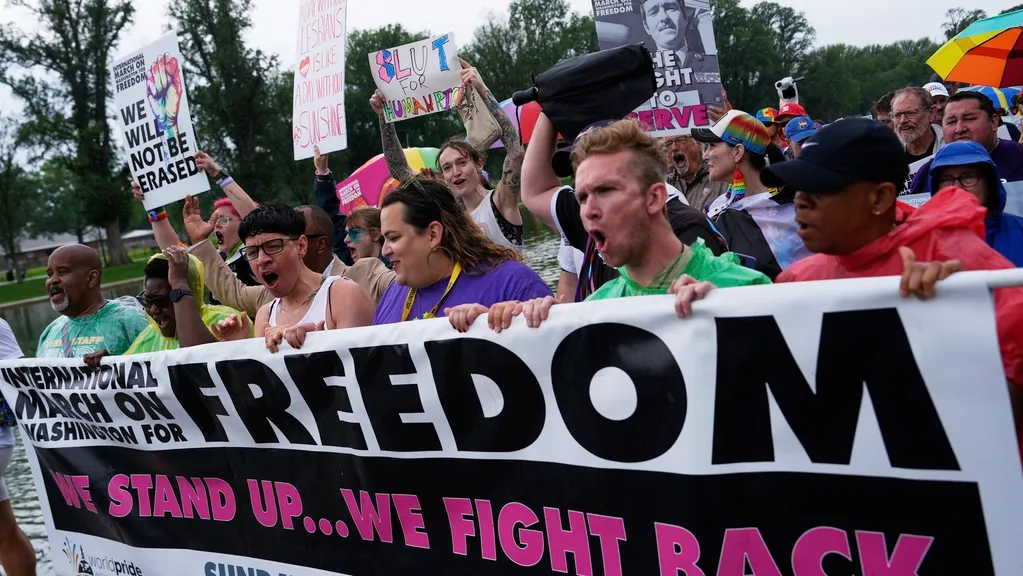December 21, 2013
Obama Focuses on a Tough Year's Ups, Not its Downs
Jason St. Amand READ TIME: 5 MIN.
Has the fifth year of his presidency been its worst? President Barack Obama laughs off such questions even as he acknowledges many months of frustrating ups and down.
"That's not how I think about it," Obama told reporters during his annual end-of-the year news conference.
Instead of brooding about tumbling approval ratings, the disastrous rollout of his signature health care law or the pile of unfinished domestic priorities, Obama looked ahead to the promise of 2014 and predicted "a breakthrough year for America."
Before he joined his family on Air Force One for a Christmas vacation in his home state of Hawaii, Obama suggested that, given widespread criticism, he may alter the power of the National Security Agency to collect information on Americans.
And when it came to the start of his health care law, Obama conceded that "we screwed it up," and said, "I'm going to be making appropriate adjustments once we get through this year." It was unclear if he meant to signal high-level personnel changes.
Obama does have some reason to be optimistic. He spoke hours after the government announced the economy grew at a solid 4.1 percent annual rate from July through September, the fastest pace since late 2011 and significantly higher than previously believed. And he heralded a modest bipartisan budget deal that cleared Congress this week, saying that while it's too soon to declare a new era of bipartisanship, Washington is "not condemned to endless gridlock."
A presidential task force has suggested dozens of ways to limit the NSA programs. The recommendations were released just days after a federal judge declared the NSA's bulk collection of Americans' phone records unconstitutional, ratcheting up pressure on him to make changes.
The president insisted that the NSA has not inappropriately used the massive amounts of data in its possession, though he added, "We may have to refine this further to give people more confidence."
After lying dormant for years, the government surveillance issues shot into the spotlight after former NSA contractor Edward Snowden leaked a trove of secret documents. Snowden is a fugitive from the U.S. and living in Russia, where he received temporary asylum. Some of his supporters have pressed Obama to grant him amnesty, though the president declined to comment on those calls.
"I will leave it up to the courts and the attorney general to weigh in in public on Mr. Snowden's case," he said.
The president opened his hourlong news conference with upbeat news on his health care law, announcing that 1 million people have enrolled in federal and state insurance exchanges since Oct. 1. That's more than two-and-a-half times the number on Nov. 30, when major fixes to the deeply flawed sign-up website were completed.
"The demand is there," he said. "The product is good."
Still, it was too soon to say whether the widely panned health care rollout had turned a corner for good. The HealthCare.gov website was down for part of the day Friday as technicians attempted to fix an error that occurred Thursday night when the site was undergoing routine maintenance. And the administration has had to enact a series of delays and exemptions for businesses and individuals, including one just Thursday for some people whose health insurance policies were canceled because of the law's new standards.
No one in the administration is known to have been fired over the health care failures. Obama said he would make "appropriate adjustments once we get through this year." There have been repeated calls for the ouster of Health and Human Services Secretary Kathleen Sebelius, but Obama gave no indication that was what he had in mind.
Other disputes lie ahead. Obama renewed his long-standing statement that he will not negotiate concessions with Republicans in exchange for legislation that will be needed in late winter or early spring to raise the nation's debt limit. "It is not something that is a negotiating tool. It's not leverage. It's a responsibility of Congress," he said, although he added he was willing to discuss other issues separately.
On a key foreign policy concern, Obama said it would be wrong to impose new sanctions on Iran at a time when the United States and other nations are testing an interim accord designed to curtail Tehran's nuclear program. If necessary, "we can pass new sanctions in a day," he said, referring to lawmakers.
The president also addressed his decision to include openly gay athletes in the U.S. delegation to the Winter Olympics in Russia, which has a national law banning "gay propaganda." Obama said the delegation, which includes athletes Brian Boitano, Billie Jean King and Caitlin Cahow, shows the U.S. doesn't make distinctions on the basis of sexual orientation.
The Sochi Games are the first since 2000 to which the U.S. is not sending a president, former president, first lady or vice president. That decision has been seen as an indication of Obama's increasingly tense relationship with Russian President Vladimir Putin.
Following the news conference, Obama and his family were to depart for Hawaii. It's the first year that last-minute legislative wrangling has not prevented the president from departing on schedule.
Obama did leave behind a New Year's resolution before boarding Air Force One.
"My New Year's resolution is to be nicer to the White House press corps," he said.





